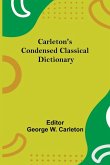The wellerism - so called in English because it is a form of expression typical or reminiscent of Sam Weller or his father, two celebrated characters in Dickens's Pickwick Papers - is a major subtype of the proverb. It consists of three parts: a speech or statement (often a proverb), identification of the speaker, and identification of the situation, which gives the expression an ironic or humorous twist, often in the form of a pun. A Dictionary of Wellerisms is the first work to collect all of the wellerisms recorded in the English language. Containing a wealth of wit and wisdom, it also offers a preface, bibliography, lengthy introduction, and two indexes, one of speakers, one of situations. Wellerisms: `Prevention is better than cure,' said the pig when it ran away from the butcher. `We'll have to rehearse that,' said the undertaker as the coffin fell out of the car.
Bitte wählen Sie Ihr Anliegen aus.
Rechnungen
Retourenschein anfordern
Bestellstatus
Storno









